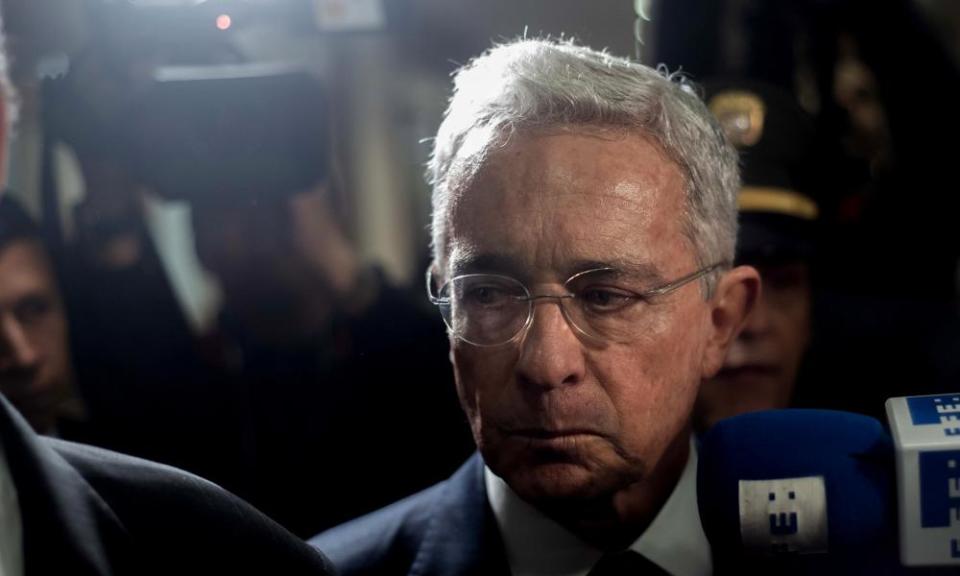Colombia: court orders detention of ex-president Uribe amid fraud inquiry

Colombia’s supreme court has ordered the detention of the hardline former president Álvaro Uribe amid an investigation into allegations of witness tampering and fraud in relation to crimes committed during the country’s 52-year civil war.
Tuesday’s decision shocked Colombians, who remained deeply divided over the Uribe’s 2002-10 administration, which was defined by his military campaign against the Revolutionary Armed Forces of Colombia (Farc), a leftist rebel group that later demobilized in 2016.
No Colombian president has been formally detained before.
“This is huge, not least because Uribe is considered the most powerful man in the country,” said Sergio Guzmán, the director of Colombia Risk Analysis, a consultancy. “It shows that nobody is above the law in Colombia, not even Uribe.”
Uribe remains an influential and deeply polarizing figure: his supporters say he neutered a violent Marxist group that had terrorized the country since the 1960s. His critics say he did so at an inexcusable cost to human rights.
Related: Uribe's Colombia: The dark side of a country transformed
During his presidency, rightwing paramilitary groups flourished, terrorizing civilians suspected of collaborating with the rebels. In what would later be known as the “false positives” scandal, soldiers from the army abducted and murdered thousands of civilians, declaring them rebel combatants in order to boost statistics and justify US aid.
Uribe has also been dogged by persistent allegations of involvement in the drug trade, a charge he has strongly denied.
“The loss of my liberty causes me profound sadness for my wife, for my family, and for Colombians who still believe that I have done something good for the country,” Uribe tweeted immediately after the court’s ruling.
The case against Uribe stems from a feud with leftist senator Iván Cepeda, who the former president in 2012 accused of plotting to falsely link him to paramilitary groups.
The court in 2018 found that Cepeda’s investigation was legal, and that Uribe’s allies had attempted to tamper with witnesses. The court has yet to rule whether there is enough evidence to bring Uribe to trial. Uribe has denied any allegations against him.
International rights groups celebrated a show of independence from the country’s courts.
“I congratulate the supreme court for acting responsibly in ordering president Uribe’s house arrest,” tweeted José Miguel Vivanco, Americas director at Human Rights Watch. “The court shows no one – not even the most powerful – is above the law. Judicial independence must be respected.”
Reaction to the news followed Colombia’s deep political fault lines. Uribe’s supporters – or uribistas – called for marches in his defense, while in a liberal neighbourhood in Bogotá, the capital, people played the national anthem and danced on their balconies in celebration.
“My heart breaks with sadness at the injustice done towards Álvaro Uribe, and the country hurts,” tweeted Natalia Bedoya, a social media influencer and prominent Uribe supporter. “Millions of Colombians are here to support and back him up.”
In contrast, some victims of the violence during Uribe’s government expressed joy and relief.
Luz Elena Galeano, whose husband was forcibly disappeared in 2008 when rightwing paramilitaries invaded their neighbourhood in Medellín, said: “It’s a historic and unforgettable day. We can only hope that this criminal admits to all the crimes that he committed and that he accepts that it was him that made us all live among paramilitaries.”
Uribe’s looming presence in Colombian politics is hard to overstate. He was a key figure in efforts to undermine the 2016 peace deal with the Farc, successfully leading the no campaign in a referendum on the deal.
A modified deal was later ratified in congress, but Uribe re-emerged as a kingmaker in the 2018 presidential election which was won by his protege, Iván Duque.
Jaqueline Castillo’s brother, a victim of the false positives scandal, was murdered by soldiers in 2008 after they lured him into the countryside with the offer of a job.
“There’s only relief in my heart as we get closer to justice,” Castillo said. “Justice will always get its man.”
In a televised address on Tuesday, Duque defended his mentor, saying: “I am and always will be a believer in the innocence and honor of someone who by example has earned a place in Colombia’s history.”

 Yahoo News
Yahoo News 